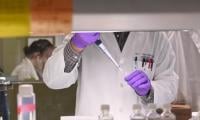KARACHI: Pharmaceutical firm, Searle Company Limited on Friday said it finalised a deal to import Remdesivir, an antiviral drug, from Bangladesh.
In a bourse filing, the company said it has partnered with Beximco Pharmaceuticals of Bangladesh to provide an immediate supply of Remdesivir at an affordable price, helping healthcare providers in Pakistan to treat hospitalised COVID-19 patients.
“The Searle Company Limited has successfully entered into an exclusive licensing & marketing agreement with Beximco Pharmaceuticals, Bangladesh,” the company said.
“This partnership will provide an immediate supply of the finished product at an affordable price and will help healthcare providers of Pakistan to treat their hospitalised COVID-19 patients without any delay.”
Initially, Searle is planning to import Remdesivir in finished form to meet the country's urgent requirements.
“Searle is actively taking the matter to the relevant authorities of Pakistan for necessary regulatory approval,” the statement added. “Searle is confident that in the existing pandemic, the relevant authorities will consider the matter on an urgent basis to support the product availability on fastest track.”
The current COVID-19 case count in Pakistan stands at 64,028 with active cases at 40,406. The World Health Organisation expects COVID-19 cases in Pakistan to rise to 200,000 by mid-July 2020. The statement said Searle is also planning to donate a sizeable quantity to the government of Pakistan, which is actively fighting against this pandemic.
Bangladesh-based Beximco Pharmaceuticals Limited recently announced the launch of Remdesivir, under the brand name Bemsivir, an antiviral drug, which has been recently granted Emergency Use Authorization by the US Food and Drug Administration for the treatment of COVID-19.
Beximco Pharma is the first company in the world to launch a generic version of remdesivir for the treatment of COVID-19.
Earlier, Ferozsons Laboratories through its subsidiary BF Biosciences has successfully concluded non-exclusive license agreement with Gilead Sciences for the manufacturing of the same drug. Pakistan’s pharmaceutical sector as whole is heavily reliant on imports of Active Pharmaceutical Ingredient (API) and the limited capacity in the chemicals sector along with research restricts local production. Pakistan imports more than 50 percent of raw material from India and China.
During 2019, Pakistan halted trade with India in retaliation to New Delhi's decision to revoke Article 370 and 35-A of the Constitution. This severely affected the availability of many medicines and raw material. The decision to halt trade was reversed a month later. The current scenario of reliance on imports for a long time, and the resultant volatility of price of raw material, delays in product approvals and price controls are the major challenges the industry faces.
Ufone 4G and ConnectHear officials posing for the photo after agreement on December 19,2024. — Ufone WebsiteKARACHI:...
An undated image of Islamabad United players celebrating. —PCB/FileLAHORE: Tetra Pak Pakistan has extended its...
PPP leader and Punjab's governor designate Sardar Saleem Haider Khan meets JazzCash offficials in this undated photo....
Traders work on the trading floor at the New York Stock Exchange in New York City, US. —ReutersLONDON: Major global...
Istanbul Mayor Ekrem Imamoglu, from the main opposition Republican People's Party , addresses his supporters from the...
A worker operates a machine preparing fabric at the Kohinoor Textile Mills in Lahore on July 20, 2023. — AFPLAHORE:...







